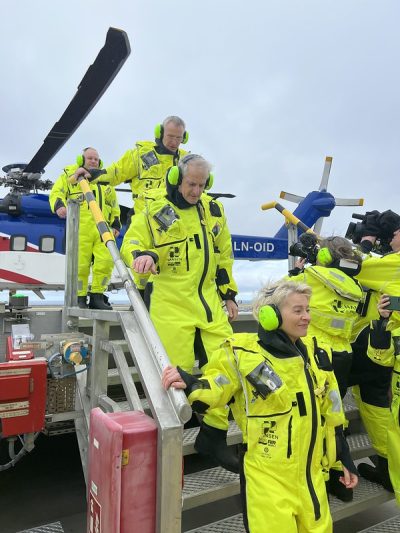Energy prices and supplies have continued to dominate the agendas at some very demonstrative and political meetings lately. The concerns and arguments that arise often center on whether Norway is sending enough or too much of its resources abroad.

Everyone was all smiles when Prime Minister Jonas Gahr Støre hosted the president of the EU Commission, Ursula von der Leyen, and NATO Secretary General Jens Stoltenberg on a helicopter flight out to Norway’s (and the world’s) largest gas field, just 65 kilometers northwest of Bergen. Along with the CEO of Norway’s state oil and energy company Equinor, Anders Opedal, the delegation was high-level indeed and full of political platitudes.
“We’ve seen how (Russian President Vladimir) Putin has tried to use energy as a weapon,” Stoltenberg (a former Norwegian prime minister himself) told those along for the ride. “With the help of Norwegian gas, we have made sure Putin was unsuccessful.”
Prime Minister Støre, meanwhile, boasted of the “intense cooperation” between Norway (which is not a member of the EU) and the EU Commission. “Norway has increased gas deliveries to Europe and it’s our ambition to remain at this level for the next four to five years.” Gas from the huge Troll A platform now accounts for 10 percent of all consumption in the EU, with other Norwegian fields now sending up to 40 percent of all deliveries to the EU. Norway has emerged as the EU’s single largest supplier.

The top-level visit to Troll A, which Støre’s government had tried to keep secret for security reasons until it actually occurred, “marks the importance of energy and secure supplies, and of the energy installations themselves,” Støre said. “That’s why we also have NATO’s secretary general with us.”
The EU and NATO are cooperating on security of the installations and pipeline infrastructure, to boost Norway’s own security systems. NATO, at the request of Norway and Germany, is also coordinating special measures to address any weaknesses in critical subsea equipment.
Supplies declined when prices fell
Exports of Norwegian gas via pipelines to the EU, however, actually fell by 8 percent during the first two months of this year, raising questions that Equinor hasn’t been sending all the gas it could. That kept prices higher than they otherwise might have been. Newspaper Aftenposten reported earlier this month that questions arose when it became clear that Norway was no longer sending all the gas it could to the continent.
Both the Reds and Socialist Left (SV) parties in Parliament had challenged government proclamations that Norway was pumping up and sending off maximum gas supplies. Equinor itself had told its investors that it had opted to put a priority on value (price) over volume. Business news service E24 had reported that Equinor’s export of pipline gas was reduced by 9 percent during the fourth quarter of last year. Deliveries in January and February were 8.4 percent below those in the same two month last year, before Putin launched his invasion of Ukraine.

The Reds and SV thus questioned whether Norway really was “delivering as much gas as possible every day,” like Støre stated several times last year. Oil & Energy Minister Terje Aasland has also claimed the same as late October.
Aasland defended the reduction in gas shipments by claiming that “everyone benefits when Equinor reduces sales of Norwegian gas to Europe when demand isn’t at the top.” He stressed that Norway hasn’t said it will produce “max gas,” only that the opportunity to do so will be there when needed.
It’s a sensitive situation, because Norway has already been accused of reaping profits from Russia’s war on Ukraine. Reducing gas supplies to Europe to keep prices high is not popular, especially when consumers are reeling from high energy bills. Sofie Marhaug, energy police spokesperson for the Reds, all but accused Aasland of “twisting reality in order to avoid admitting anything.” She also claimed that the government hasn’t used its full power as 67-percent owner of Equinor to follow up on its promises to Europe.
Alleged attempts to keep gas prices high also irritate Marhaug: “To say that ‘everyone benefits’ from something that is so profitable for Norwegian producers is rather audacious.” Even after price declines late last year, average gas prices were still 80 percent higher than they’d been from 2018 to 2021. Aasland defended the decline in gas sales by also noting that gas storage facilities Great Britain were full, and that there was a need for planned maintenance.
The government, meanwhile, has also cut electricity exports to the UK, resulting in reduced revenues for Norwegian power producers of as much as NOK 8 billion. That can help smooth ruffled feathers in Norway’s Center Party, however, which shares government power with Støre’s Labour Party and firmly opposes electricity exports that will result in higher electricity rates at home.
Late last week, the government and state-owned producer Statkraft reduced capacity on the power cable between Norway and Great Britain. That means power producers in Southern Norway won’t be sending as much electricity abroad as before, just in time for the Center Party’s annual meeting over the weekend. That’s when Center Party leader Trygve Slagsvold Vedum, already under pressure from voters and party members, needed to defend government policy.
He didn’t get any sympathy votes after revealing that he’s also been diagnosed with MS: Center Party veteran Per Olaf Lundteigen declared from the podium that Center leaders were violating their own government platform, which calls for “stable, predictable and competitive electricity prices” along with Norwegian control over all decisions that affect Norway’s own energy security. Lundteigen accused the government of violating that, and leaving Norwegians with “German electricity prices in Southern Norway.”
Another Center Party veteran and former Oil & Energy Minister herself, Marit Arnstad, disagreed. She came to Vedum’s defense by stating that “we are in line” with the platform and noting that some exports had ceased while government compensation for high rates remains in force.
NewsinEnglish.no/Nina Berglund

